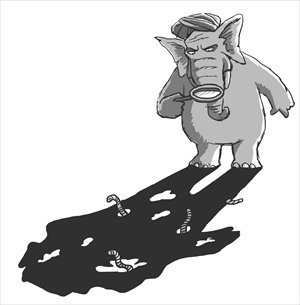Corrupt politicians spoil India's potential

I was in South Korea earlier this month as part of the India-South Korea Media Exchange Program. At several platforms there I was asked a question repeatedly: Why has India not been able to reach its true potential? I gave a brutally honest answer.
The reason why India has not progressed at the pace it should have is mainly because of rampant corruption for which the Indian leadership and the bureaucracy have to be blamed. But the people of India are no less to blame because they have allowed it to be perpetrated to them.
India's bane has been its parochial, self-serving politicians. Gone is the era of selfless leaders like Mahatma Gandhi, Jawaharlal Nehru and Sardar Vallabhbhai Patel who lived simply and thought highly.
It is impossible to find any political party in today's India that does not have corrupt leaders. Scores of politicians are facing proceedings in criminal and corruption cases and they cut across the entire political spectrum.
The problem of inept political leadership makes it double trouble for the man on the street as it is intricately entwined with corruption. The common man in India wouldn't be much bothered about mega-scams worth billions of dollars if only three things could be ensured by Indian leaders: transparent and efficient public services, honest police forces and a judiciary that decides cases in weeks or months, not decades. But precious little has been done in this regard by the Indian leaders.
I also told my Korean interlocutors that an export-led economy like South Korea which does not boast of rich natural and mineral resources, and is one-tenth of the size of India, has been able to banish poverty and become a fully developed nation only because this nation has had an able ruling class and a conscientious public.
The comparisons between India and South Korea are striking. India became independent in 1947 while South Korea emerged a year later. Till the 1960s, South Korea survived on foreign aid and many African nations had better economies. Today, South Korea has a trillion dollar economy for its 50 million people while India's trillion-dollar GDP is for 1.2 billion people.
Yet modern India is nothing less than a miracle. The first and foremost miracle is that it has survived as a nation since its independence from colonial British rule on August 1947 when experts predicted that it would disintegrate into 20 or 30 states. That hasn't happened and the chances of its disintegration now are now as remote as finding water on the sun.
In ancient times, India invented the decimal and the zero. India was home to the world's first university when its Taxila University was set up in 700 BC and followed up with another trail-blazer in the field of education with the setting up of the Nalanda University in the 4th century BC.
Today's India can successfully boast of maintaining its unity and integrity; its vibrant democracy, successful programs like the Pradhan Mantri Gram Sarak Yojana, the Right to Information, the Right to Education and the Mahatma Gandhi National Rural Employment Guarantee Act. The Right to Food is set to be unveiled soon.
India's space program began in 1975 with the launch of its first satellite, Aryabhatta, and is now eyeing a multi-billion dollar rocket-launching industry on the strength of space agreements with over 20 countries. Its nuclear and missile programs are spearheaded by such missile systems as the Agni, Prithvi, Akash and Nag, with the newest addition to the Indian missile bouquet in BrahMos, the world's fastest Cruise missile jointly developed by India and Russia.
However, modern India's achievements are marred by major failures or challenges like corruption, poverty, illiteracy, unemployment and population explosion. India's dreams of becoming a superpower will remain pipe dreams only if these challenges are not overcome speedily.
This cannot be done till India gets visionary leaders. The pity is that today's India has politicians who think of the next election and not statesmen who think of the next generation.
The author is a New Delhi-based journalist-author and a strategic analyst. He can be reached at bhootnath004@yahoo.com.